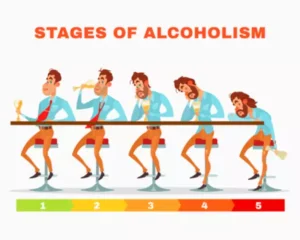
Excessive drinking can lead to severe health issues, both in the short term and long term. Immediate risks include alcohol poisoning, accidents, and injuries. Long-term risks include liver damage, cardiovascular disease, and mental health disorders. It’s crucial to remember that the effects of alcohol vary from person to person, depending on factors such as body weight, tolerance, and the rate of consumption. Excessive alcohol consumption can intensify the impairments and increase the risk of accidents or dangerous situations. At this stage, individuals may feel more talkative, lively, and inclined to engage in conversations and interactions.
- Yet that’s what slowly happens, to a certain extent, when you drink and don’t stop drinking alcohol.
- After our testing period, users said their skin looked more hydrated, brighter, softer, and plumper, with a noticeable reduction in dullness.
- The experience of being drunk can feel different for everyone, but it commonly results in a decrease in inhibitions and a heightening of emotions.
Practical Tips for Your First Time Drinking Alcohol

Plus, we’re constantly introducing new features to optimize your in-app experience. We recently launched our in-app chatbot, Melody, powered by the world’s most powerful AI technology. Melody is here to help you adjust to a life with less (or no) alcohol. For many, drinking for the first time can be a fun experience, but for others, not so much. Still, for some people, their relationship with alcohol is raising some red flags. Whenever you find yourself in the drinking continuum, check out the Reframe app for lots of alcohol-related information and resources.
- As intoxication progresses, confusion and disorientation may become more apparent.
- The experience of being drunk can be divided into several stages, each characterized by different physical and emotional effects.
- The more informed we are, the more mindful decisions we can make.
- I’ve never had a ton of alcohol (1-2 wine coolers in one sitting) and don’t get the appeal.
- “It’s a drink that is based on the science of alcohol, particularly the low doses of alcohol that relax you and make you more sociable,” Nutt tells The Independent.
Impaired Judgment and Decision-Making

Continuing to drink when already feeling drunk can increase a person’s risk of complications. Alcohol abuse and binge drinking are common, and they put many people at risk of alcohol poisoning, alcohol addiction, and chronic alcohol-related health problems. Usually a man will start to feel tipsy after consuming 2 to 3 alcoholic drinks in an hour. A woman will feel tipsy after consuming 1 to 2 alcoholic drinks in an hour.
Confusion
In this section, we will explore the initial effects of alcohol and the subsequent feelings of relaxation and euphoria. The confusion stage of intoxication occurs when someone reaches a BAC of 0.18 to 0.30. For most men, this stage happens when they’ve consumed more than five drinks per hour, and for women, more than four drinks per hour. A feature of this stage is blacking out or losing memory while drinking. People in this stage will likely also have their balance and coordination impaired enough to result in staggering and an inability to stand. Many people are curious about how alcohol affects the body, both physically and emotionally.
- They underwent brain imaging with MRI at the end of the study.
- In this article, we’ll break down the experience of being drunk, how it feels at various stages of intoxication, and the risks that come with alcohol use.
- Most people start to feel the effects of alcohol within minutes of consuming a drink, depending on their body size, metabolism, and whether they’ve eaten beforehand.
- A lot of human history has involved taking substances like alcohol and marijuana, and many people consume either of these substances (and sometimes both) to aid in their enjoyment of life.
While many non-alcoholic drinks want to replicate the taste of a tipple, Sentia wants to replicate the effects
- Plus, it layers beautifully under makeup, leaving skin feeling soft, hydrated, and prepped for the day ahead.
- When we’re analysing the feeling of being drunk, it helps to think about someone who never normally drinks.
- This is your body’s way of reacting to the toxic effects of too much alcohol.
- Testers noted its thick, gel-like consistency, with just one pump being enough to cover both the face and neck.
- Several factors influence how drunk you feel and how your body processes alcohol.
Suddenly everybody in the bar is your new best friend and you are dying to tell them your life story. Not realizing how drunk you actually are, you promise to stay in touch, take your new BFF’s phone number, and head to the bathroom where you forget about him/her forever. When that first drop of delicious alcohol hits your tongue, your mind and body are taken to another place. The experience of being drunk can feel different for everyone, but it commonly results in a decrease in inhibitions and a heightening of emotions. Get helpful tips and guidance for everything from fighting inflammation to finding the best diets for weight loss…from exercises to build a does it feel good to be drunk stronger core to advice on treating cataracts.

This is due to the alcohol affecting the central nervous system, specifically the neurotransmitters that regulate mood. During this stage the effects of alcohol are not apparent or obvious, impairment may be detectable by certain tests, and behavior is nearly normal. In extreme cases,too much alcoholcan lead to coma or death, so it is important to recognize thesignsand stages of being drunk. Someone might dread the tossing and turning that comes with insomnia.
Molly Addiction: Symptoms and Side Effects
Set limits on your alcohol consumption, stay hydrated, eat before drinking, avoid binge drinking, and understand your tolerance level to make safer decisions about drinking. The effects of alcohol can last from a few hours to longer, depending on various factors, including the amount consumed, individual metabolism, and overall health. Being drunk can initially feel euphoric and social, but as intoxication increases, it can lead to confusion, loss of coordination, and emotional instability. However, the social context can also contribute to risky behaviors, https://ecosoberhouse.com/ such as binge drinking or drinking and driving. Understanding the influence of social settings on drinking behavior is crucial for promoting healthier drinking habits. When alcohol enters the bloodstream, it travels to the brain, where it affects neurotransmitters—chemical messengers that transmit signals between nerve cells.
Regular heavy drinking can also contribute to the development of alcohol dependence and addiction. As intoxication progresses, individuals may experience nausea and dizziness. These symptoms are the body’s way of reacting to the excessive amount of alcohol in the bloodstream. In severe cases, vomiting can occur, which is the body’s attempt to expel the toxins.

Testers initially thought it would be just a makeup-skincare hybrid but were pleasantly surprised by how much their skin improved after 2-3 Sober living home weeks of consistent use. Despite The Ordinary’s budget-friendly price point, testers describe the application experience as unexpectedly luxurious. The serum’s consistency is just right — not too runny — making it easy to apply and massage into the skin without any mess. While niacinamide is naturally produced in our bodies, unlocking its full range of skincare benefits requires topical application.